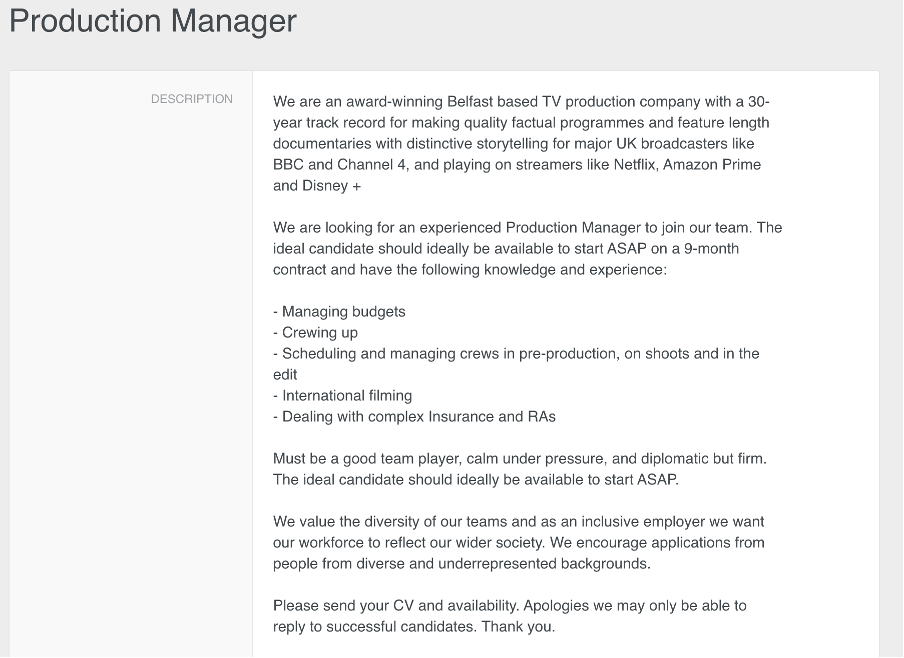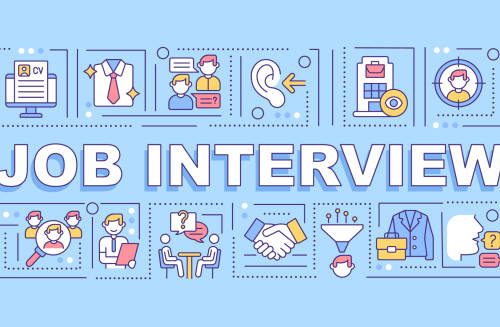Stuck in Simulation
Interviews require you to sell yourself as an asset; you must make the company you’re applying with believe that you are the single most suited person for a position over any other applicant. Interviews, simulated or not, are something I dread for this reason. However, when the morning for these simulated interviews arrived, I found myself not dreadful, but nervously excited, allowing me to go all out to ensure I made the exercise a valuable experience for myself. I will be using Gibbs’ Reflective Cycle (Gibbs, 1988) to recall my experience of the simulated interview process and allow me to apply what I learned to future opportunities.

Description

Before the interviews took place, we were asked to upload a job listing that we felt we were suited to apply for upon graduation so that we could prepare questions for each other. I found my job advertisement via the NI Screen website as I thought they would advertise the most relevant jobs for my chosen career. The position I chose to apply for was a production manager. Having production experience, I thought I could argue my suitability for this job.
On the day, I was panicking at first as no one from my group had shown up. There was brief consideration of me joining another group who had not had time to prepare questions for me and vice versa. The relief I felt when someone from my group arrived allowed me relax considerably. While interviewing my partner, another group member arrived providing further depth to the exercise. I was last to be interviewed, allowing me to acclimatise to the atmosphere and feel prepared for the types of questions asked. Just before, I had to leave the room for five minutes while my group decided who would ask which questions. This is when I started to feel nervous. Upon re-entering the room, I greeted both interviewers with a handshake and introduced myself, holding myself as I would for genuine prospective employers. They asked many questions relating to my personal character and transferable experience I had which made me suitable for the position. I tried to answer each question the best I could and in ten minutes, the interview was over. I thanked them for taking the time to speak with me and they told me they would contact me, providing some realism to the exercise. Lastly, I received my feedback form.
Feelings
Overall, I was more open to the experience on the day than I had expected. Leading up to the interviews, I was dreading it, especially being aware that I didn’t know anyone in my group very well. I expected to be nervous but luckily after sitting down with everyone else, my nerves became anticipatory rather than fearful. Being the last interviewed in my group put me at ease as it allowed me get into the flow and think about how I myself would answer the questions I was asking.
During my interview, I could feel that I was nervous, often finding myself rambling to find my way to the point I was trying to make. Despite this, I thought it had gone well enough as I was able to make strong points and relate my experience to the job. A couple of questions caught me off guard and took me longer to answer, for example, “what are your weaknesses?” This was nerve-wracking as I was hyperaware of how long it took me to begin giving an answer and I knew I needed to sell myself but avoid coming across as conceited. In the end, I was able to provide relevant answer without putting myself down too much which was relieving.
Evaluation
My peer/interviewer feedback form provided an insight into how I was perceived during my interview, allowing me to reflect on what I did well and what I need to improve on. Most of my feedback was positive, my group scoring me 4/5 or 5/5 on all sections. They said that I seemed qualified for the job and passionate for the industry as I was able to relate my own experience in producing short films to the role as well as my own personal interest in coffee. I was described as friendly, speaking clearly and holding eye-contact which looks well for a job in production management in which communication skills are invaluable. A negative about my interview was that I was noticed to be fiddling with my hands throughout which I wasn’t even aware of. This communicated my nerves to the interviewers.
Another negative that I would add to this feedback was that I took a while for certain questions to get to the point, often rambling and confusing myself as to what I was trying to convey with my anecdote.
Analysis
In hindsight, I should have done more to prepare for my interview for example, preparing base answers to possible questions. That way, I think I could have avoided being as nervous as I was, relying on my preparation and practice. I could have also utilised the STAR method to structure my answers to circumvent rambling, providing clear, concise responses.

Conclusion
The simulated interview was a very useful experience for me to understand that while I might be able to objectively understand my strengths and suitability in my own head, the pressure of the interview environment and being closely observed by other people makes it difficult for me to provide relevant, concise and confident answers to interview questions.
Action Plan
For future interviews, to avoid running into these same issues again, I will prepare more thoroughly in advance, practicing answers to similar questions asked. I will also use the STAR method to structure these answers and streamline my responses. This preparation should also reduce my anxiety about interviews in the future.
Bibliography
Gibbs, G. (1998) Learning by Doing: A Guide to Teaching and Learning Methods. Oxford Brooks University, Oxford.
Interviews: The Dreaded Conversation
You May Also Like

Interview a New You! – Becoming an Interview Guru
24 February 2023
To Be Or Not To Be – That Is The Interview Question
23 February 2023
